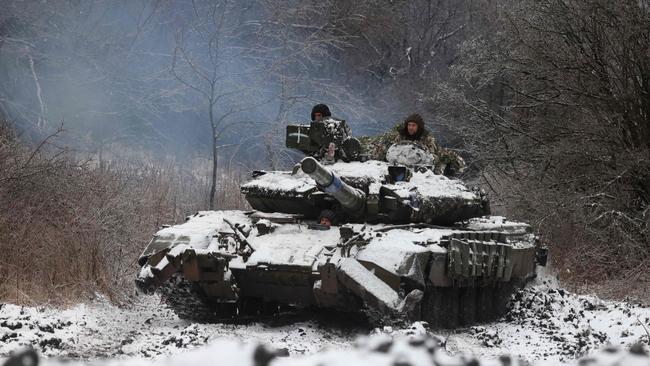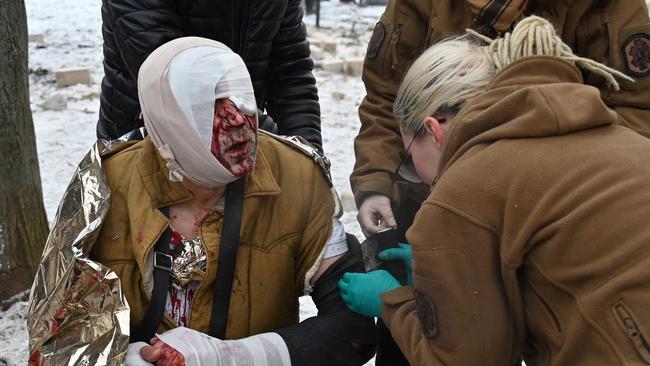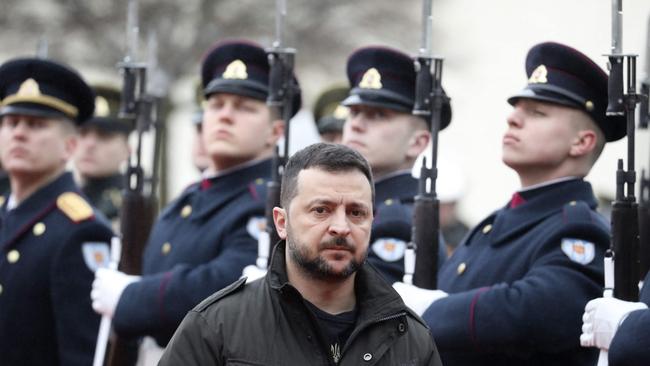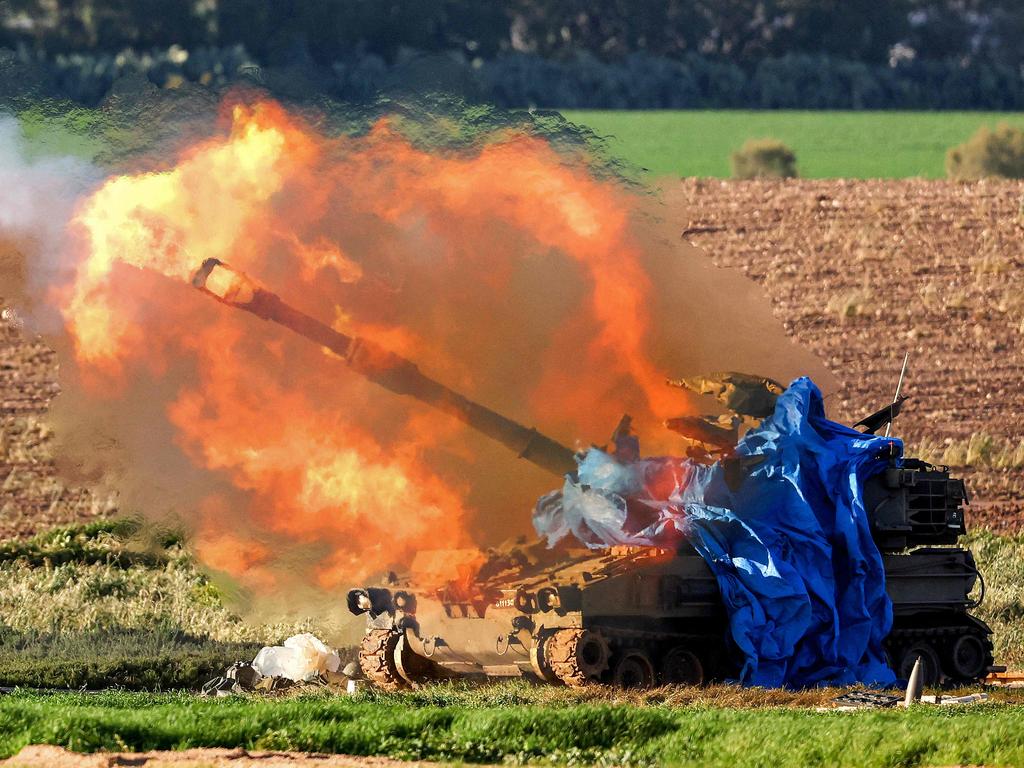History tells Eastern Europe to get ready for Putin, lest Ukraine falls
The message from the front line is that we in the West must do more to stop the Russian tyrant.

The global security situation is precarious. It’s vital that we understand how the different conflicts and brewing tensions interlock. I was in the middle of talks with government officials and think tankers in Poland, in mid-November, when a military historian friend back in Australia emailed, asking whether the war in Gaza had “tended to knock Ukraine out of the news” in eastern Europe, as in the English-speaking world.
It had done nothing of the kind, I tersely pointed out to him. The war in Gaza is a small war, even if it has reverberations across the Middle East and around the world. Israeli casualties number in the hundreds, Hamas casualties (military and civilian) in the low tens of thousands. The war in Ukraine is a large war. Russian and Ukrainian casualties both number in the hundreds of thousands. And minds in Poland and the Baltic states, each of which I visited between November 11 and December 1, are firmly fixed on it.
In Warsaw, Helsinki, Tallinn, Riga and Vilnius, the problem of what to do about Vladimir Putin’s savagery was almost the sole topic of conversation. When it strayed from that subject, the next most important was China and its ambitions. The Gaza war ran a distant third, chiefly because it was assumed that Israel would hold its line and crush Hamas. The chief link between Ukraine and Gaza was the clear opinion that, if Ukraine had been as well armed as Israel, Russia would never have dared invade it.
A Sino-American war in Asia would be the Big One. But the other two are being closely watched from Beijing – and it is on the wrong side in both cases. If we are not clear about this, as a liberal democratic middle power with a low commitment to defence and security, we put ourselves at serious risk. Europe did not expect a major war, but it has one. Israel thought Hamas was asleep and got a rude awakening. Xi Jinping’s China is a far bigger player than Russia or Hamas and is in our part of the world.
But how all this looks from Poland and Lithuania is worth pondering. I had high-level discussions with officials and intellectuals in countries whose histories are littered with brutal assaults from Russia and who are fully seized of the importance of checking Russian imperialism in Ukraine. They have no appreciable buffer zone between them and Putin’s marauding military except Ukraine. And their history tells them in their bones to be prepared, lest catastrophe strike.

It’s often overlooked in the English-speaking world that 500 years ago the Grand Duchy of Lithuania extended from the Baltic almost to the Black Sea, with the Khanate of the Crimea on its southern border. It included much of what is now Ukraine and Belarus.
In 1569, a formal union was created between the Kingdom of Poland and the Grand Duchy of Lithuania, which had been in confederation since 1386, creating the largest country in Europe. It endured until the late 18th century, but was carved up by the Russians, Prussians and Austrians in the Three Partitions, 1772, 1793 and 1795.
It lost 200,000sq km of territory (a third of its territory) and five million subjects (a third of its population) in the first carve up. Russia annexed a further 250,000 square kilometres in 1793 and annexed it altogether in 1795. It did not regain independence until 1918, with the German defeat of Russia and the Russian Revolution.
Following the First Partition, the conquering powers demanded that the Polish king Stanisław August Poniatowski and his parliament of notables officially approve the partition. He appealed to the Western European states for support, but they reacted with complete indifference. In England, Edmund Burke spoke out on behalf of the Poles and Lithuanians, but his voice was unheeded.
All that was old history when, in 1920, the Bolshevised Russians put down Ukrainian nationalists and invaded Poland, advancing on Warsaw, only to be defeated by Marshal Jozef Pilsudski (1867-1935), the founder of modern Poland.
But four years after his death, Hitler and Stalin partitioned Poland between them – what might be called the Fourth Partition of Poland – and subjected it to brutal bloodletting and oppression. Poland (with Ukraine) became the core of what Timothy Snyder, in 2010, called the “bloodlands”.
The Baltic states – Estonia, Latvia and Lithuania – were also drowned in blood in that era. After his pact with Hitler of August 23, 1939, which set Hitler free to go to war with Poland and then turn west, Stalin pressured the Baltic states into signing alliances with the USSR, which gave the latter the right to establish military bases on their territory. Once that was done, he invaded all three, in the northern summer of 1940, overturned their governments, installed communist puppet governments, incorporated them into the Soviet Union and, the following summer, conducted mass deportations and summary executions of tens of thousands of their leading citizens.
But that was just the beginning. The Nazis invaded shortly afterwards and though initially greeted as liberators, imposed their own terror and killed tens of thousands more, especially the Jewish populations of all three countries. Then the Red Army returned and exacted retribution in its turn. During my visits to Poland, Latvia and Lithuania, I not only interviewed well-placed specialists, but visited the KGB Museums in Riga (Latvia) and Vilnius (Lithuania), as well as the Warsaw Uprising Museum, the POLIN Museum of Poland’s Jews and the Katyn Museum in Poland.

All this history is real and present in those countries. For them, as William Faulkner wrote in Requiem For a Nun, “The past is never dead. It’s not even past.” What is commemorated in those grim museums gives us how we need to understand Vladimir Putin, Russian imperialist, former KGB officer, who asserts that the collapse of the Soviet Union was the greatest geopolitical catastrophe of the 20th century. It also gives us how we need to view the chiliastic savagery of Hamas and of the Iranian regime. And it gives us how we need to think when the Chinese ambassador to Australia, Xiao Qian, says that if we lend support to Taiwan we will be “stepping into an abyss”.
This was the historical, the geopolitical, the psychological context in which I spoke with scholars at the Polish Institute of International Affairs, the Centre for International Relations, the National Security Bureau and the Ministry of Foreign Affairs. No one beat about the bush. If Ukraine goes, they know they are on the front line and they know that Putin has his eye on dominance, not trade and friendship.
When some Polish notables protested the first partition, the Russian ambassador, Otto von Stackelberg, threatened to destroy the whole of Warsaw. In 1944, the Red Army stood by and watched as the Nazis crushed the Warsaw Uprising, killing 200,000 Poles and demolishing vast tracts of the old city. That is the background.
It was even more clearly the background to my conversations with Zygimantas Pavilionis, chair of the Lithuanian parliamentary committee on foreign affairs and of the Lithuanian-Ukrainian parliamentary assembly; with Rolandas Krisciunas, foreign policy adviser to the Lithuanian Prime Minister; with Kestutis Vaskelevicius, head of relations and the EU Group, in the Lithuanian Foreign Ministry; with Kestutis Budrys, chief national security adviser to the Lithuanian President Gitanas Nauseda; and with young intellectuals in key think tanks; and when I addressed a group at the Lithuanian parliament.
Pavilionis, Krisciunas, Vaskelevicius, Budrys were very impressive, deeply informed individuals.
They were unequivocal in their opinion that deterrence may be expensive, but it is much less so than war and that wider war will come if Putin is not checked in Ukraine. The 43-year-old Budrys, a brilliant young man with a bright future, spelled out the fundamentals:
1. NATO must rebuild and enhance its capacity to deter military adventures by Putin.
2. Serious diplomatic and information warfare work must be done to change Russian perceptions of the possible.
3. The United States is the key security guarantor, but Germany has a critical role to play.
In the meantime, Ukraine must be armed with critical enablers: attack helicopters, state of the art air defence, HIMARS. Polish and German forces need to be stationed in the Baltic republics, which are tiny and vulnerable. Coastal defence is vital, because Russian marines in Kaliningrad and the Baltic could overrun any given one of the Baltic states at any time.
He lamented that the fickle populations of the Western democracies are insufficiently seized of the urgency of arming up Ukraine to defeat Russia and too open to capitulationist talk about an armistice with Putin, which would only encourage a Russian build-up and demoralise the Ukrainians.
Israel, he stated, is a model to emulate: nuclear deterrence and air superiority. That’s what needs to be in place as soon as possible, ideally while preventing Russia from holding its conquered territories in Ukraine, to say nothing of overthrowing the Ukrainian government in Kyiv and installing a puppet regime.
At the end of the meeting, we shook hands warmly. He is younger, I told him, than Henry Kissinger was when he became national security adviser to president Richard Nixon, in 1969, and will, hopefully, go on to bigger and better things on the European stage. He smiled and commented: “You know, it just struck me that we have spoken for 90 minutes and, while I think you have picked my brain, I’m not sure I managed to pick yours.”
“‘Oh well,” I responded, smiling in turn, “I’m an old intelligence professional. Isn’t that how we are supposed to work?”
If I “picked” his brain, however, it was in no sense with an eye to exploitation. We are kindred spirits, he and I, as with the others I met, whose intelligence, seriousness, warmth and commitments to liberty and decency radiated from them all. The meetings introduced me to people and cultures I would want to defend alongside them. That included the Latvian ambassador to Lithuania, Solveiga Silkalna, a woman of Latvian parentage who grew up in Australia but returned to her roots in 1993; and Karlis Bukovskis, director of the Latvian Institute of International Affairs.
But perhaps the most memorable conversation I had, one which demonstrated civilisational affinities and the possibilities for discourse, at least within the West, broadly defined, was with the Polish Under Secretary for East Asian Affairs, a charming and highly educated individual, who began our meeting – ostensibly about China – with the flourish: “Doctor Monk, I understand that you are a member of the Rationalist Society of Australia and have lost your faith.”
I responded: “No, I didn’t lose my faith. I put it exactly where it belongs.”
This triggered an entirely good-natured discussion about philosophy and religion, sociology and poetry that went on for an hour. During that time, his assistant would occasionally lean across to him and murmur: “Minister, with the greatest respect, we’re supposed to be discussing China.” We eventually did, because he extended the meeting by an hour to make that possible. Then he announced, smiling, that he had to go to catch a flight to Brussels.
Why do I tell that story? Because the conversation was what “civilisation” is all about and it was conducted in the most civilised and open manner.
Vladimir Putin claims Russia has a “civilisation” that will renew the decadent West – by force and plunder, it seems. The Polish civil servant and I found that we shared a common civilisation and that we could discuss its foundations and prospects without animosity, despite divergent opinions.
This is what is at stake in our struggles with the neo-authoritarians in Moscow and Tehran and Beijing. This is what we must defend as if our lives depend upon it – because they do. This is why, along with enlightened discourse about the challenges we face, we must be prepared to arm ourselves and stand up against the avowed and violent enemies of liberal order. Liberal order? Yes, in Israel, also.
Paul Monk is the author of The West in a Nutshell: Foundations, Fragilities, Futures (2009) and Dictators and Dangerous Ideas (2018). He was officially sanctioned in 2023 by the Kremlin.







To join the conversation, please log in. Don't have an account? Register
Join the conversation, you are commenting as Logout